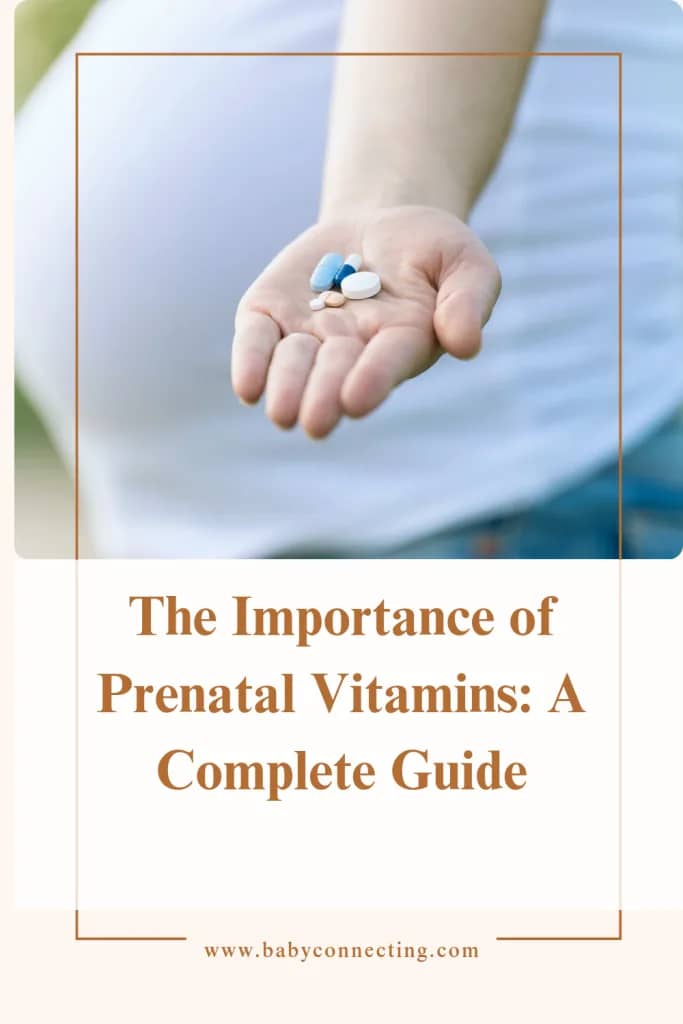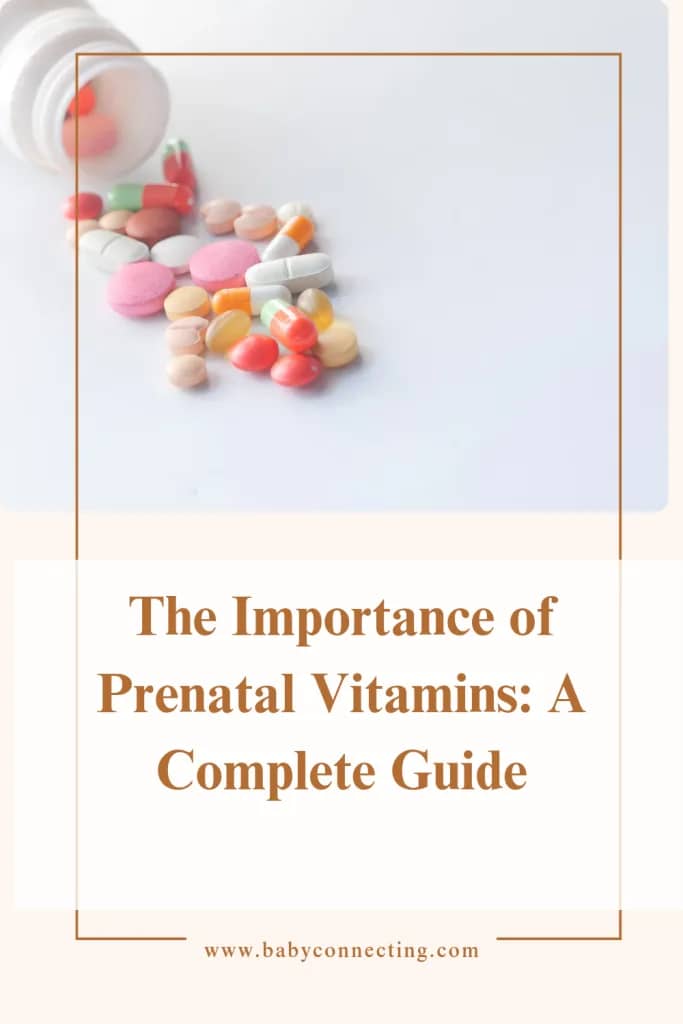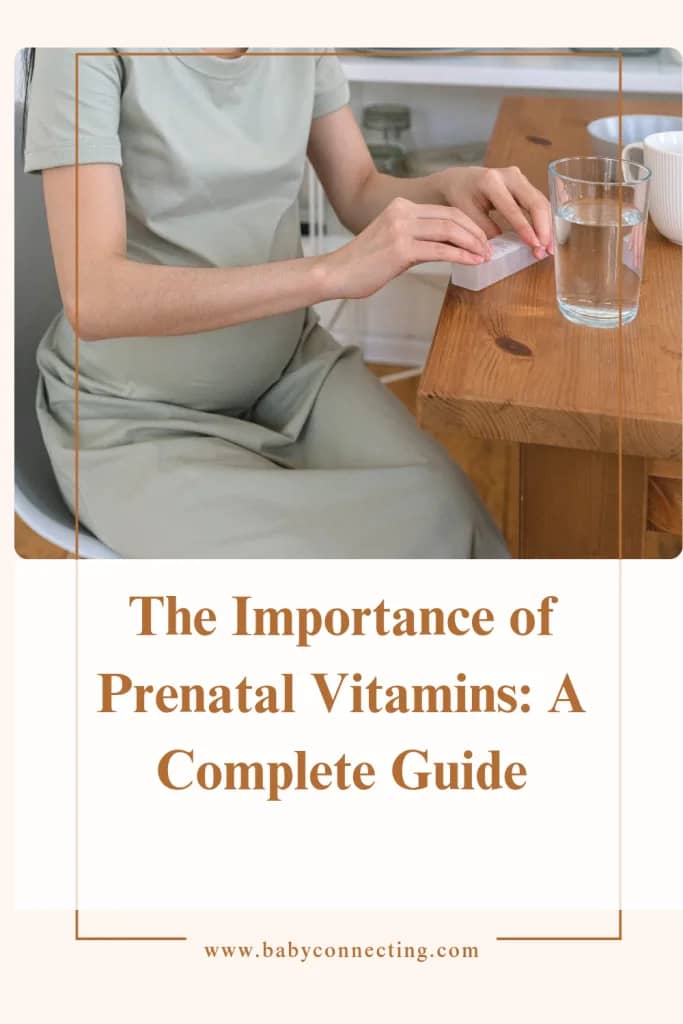The Importance of Prenatal Vitamins: A Complete Guide
Pregnancy is an exciting and transformative time, but it also places increased demands on your body. The growing baby inside of you requires numerous nutrients for proper development, and sometimes, even with a well-balanced diet, it can be challenging to meet all of your nutritional needs. This is where prenatal vitamins come in—these specially formulated supplements are designed to support both the mother’s health and the baby’s growth and development.
In this comprehensive guide, we will explore the importance of prenatal vitamins, why they are essential, which vitamins and minerals they contain, how to choose the right prenatal vitamins, and how to take them effectively for a healthy pregnancy.

1. What Are Prenatal Vitamins?
Prenatal vitamins are daily supplements that contain vitamins and minerals specifically tailored for pregnant women. They are designed to support the increased nutritional needs during pregnancy, ensuring that both the mother and baby are getting the essential nutrients they need for a healthy pregnancy. These vitamins are formulated to fill the gaps in the mother’s diet, particularly when it is difficult to get enough of certain nutrients through food alone.
Prenatal vitamins typically contain a combination of vitamins A, C, D, E, and K, as well as key minerals like iron, calcium, magnesium, and iodine. The most important component of prenatal vitamins is folic acid (the synthetic form of folate), which plays a critical role in the prevention of birth defects, particularly in the early stages of pregnancy.
2. Why Are Prenatal Vitamins Important?
Supporting Baby’s Development
Pregnancy is a time of rapid development for your baby. Prenatal vitamins provide essential nutrients that play a key role in fetal growth, brain development, and the formation of organs, muscles, and bones. For example, folic acid helps prevent neural tube defects, which affect the baby’s brain and spinal cord. Iron is necessary for your baby’s oxygen supply and red blood cell production, while calcium is crucial for building strong bones and teeth.
Preventing Nutrient Deficiencies
Pregnant women have increased nutritional needs, and it can be difficult to meet these needs with food alone. Prenatal vitamins help fill the gap and prevent deficiencies in important nutrients like folate, iron, and calcium. Deficiencies can lead to complications such as low birth weight, anemia, preterm labor, and developmental delays. Iron and folate are two of the most common nutrients that women are deficient in during pregnancy, which is why these are often included in higher doses in prenatal vitamins.
Supporting Maternal Health
Prenatal vitamins don’t just support your baby’s development—they also play a vital role in maintaining your own health during pregnancy. Many of the symptoms that come with pregnancy, such as fatigue, nausea, and weakness, can be alleviated with proper supplementation. For example, the iron in prenatal vitamins helps combat anemia, while calcium supports bone health and prevents bone loss. Additionally, adequate vitamin D levels are crucial for maintaining a strong immune system.
Reducing Risk of Complications
Taking prenatal vitamins can help reduce the risk of pregnancy complications, including preeclampsia, gestational diabetes, and low birth weight. Certain vitamins and minerals, such as calcium, magnesium, and vitamin D, have been shown to help reduce the risk of high blood pressure and preterm birth. Studies have also shown that women who take prenatal vitamins are less likely to experience pregnancy-related anemia and other complications.

3. Key Vitamins and Minerals in Prenatal Vitamins
Prenatal vitamins are specially formulated to ensure that you and your baby get all the essential nutrients needed for a healthy pregnancy. Here are the key vitamins and minerals that are typically included in prenatal vitamins:
Folic Acid (Folate)
Folic acid is one of the most critical nutrients during pregnancy. It helps prevent neural tube defects, such as spina bifida, which affect the baby’s brain and spinal cord. The recommended daily intake of folic acid for pregnant women is 400-800 mcg, and it’s typically included in higher amounts in prenatal vitamins. It is especially important to begin taking folic acid supplements before conception and during the first trimester when the baby’s neural tube is developing.
Iron
Iron is necessary for the production of hemoglobin, which helps carry oxygen in the blood. During pregnancy, the body’s blood volume increases, and iron is needed to support this extra blood supply. Adequate iron levels help prevent anemia, a condition characterized by low red blood cell count, which can lead to fatigue, weakness, and other complications. The recommended daily intake of iron during pregnancy is about 27 mg.
Calcium
Calcium is essential for building your baby’s bones and teeth. It also helps maintain your own bone density, which can decrease during pregnancy due to the increased demand for calcium. The recommended daily intake of calcium for pregnant women is around 1,000 mg. If you don’t get enough calcium through food, prenatal vitamins containing calcium can help ensure that you meet your needs.
Vitamin D
Vitamin D plays a key role in calcium absorption, ensuring that your body can effectively use the calcium from food and supplements. It also helps support a strong immune system and aids in the proper development of your baby’s bones and teeth. The recommended daily intake of vitamin D during pregnancy is 600 IU, though many prenatal vitamins contain higher doses for optimal absorption.
Iodine
Iodine is necessary for the production of thyroid hormones, which regulate metabolism and play a key role in your baby’s brain development. Iodine deficiency during pregnancy can lead to developmental delays and cognitive impairments. The recommended daily intake of iodine during pregnancy is 220 mcg.
Vitamin A
Vitamin A is essential for your baby’s vision, immune system, and cell growth. It supports the development of the heart, lungs, kidneys, and other organs. However, it’s important not to take excessive amounts of vitamin A during pregnancy, as too much can cause birth defects. Prenatal vitamins contain a safe amount of vitamin A, often in the form of beta-carotene, which is converted into vitamin A in the body.
Vitamin C
Vitamin C is a powerful antioxidant that helps protect cells from damage. It also plays a key role in the absorption of iron and supports a healthy immune system. Vitamin C is water-soluble, so it is not stored in the body, and it needs to be replenished daily. The recommended daily intake of vitamin C during pregnancy is 85 mg.
Magnesium
Magnesium is important for muscle function, nerve health, and the formation of the baby’s bones. It also helps regulate blood sugar levels and supports a healthy pregnancy. The recommended daily intake of magnesium is around 350-400 mg for pregnant women.
4. How to Choose the Right Prenatal Vitamin
With so many prenatal vitamins available on the market, it can be overwhelming to choose the right one. Here are a few tips to help you select the best prenatal vitamin for your needs:
Look for Comprehensive Formulas
A good prenatal vitamin should contain all of the essential vitamins and minerals necessary for a healthy pregnancy, including folic acid, iron, calcium, and vitamin D. Be sure to check the label to ensure that the formula contains adequate amounts of each nutrient.
Consider Your Diet
If you follow a vegetarian, vegan, or gluten-free diet, you may need a prenatal vitamin that caters to those dietary restrictions. Some prenatal vitamins are made specifically for vegetarians and vegans, with plant-based sources of nutrients like iron and vitamin B12.
Choose a Trusted Brand
Choose a prenatal vitamin from a reputable brand that you trust. Look for brands that have been tested for quality and safety. You can check for third-party testing or certifications to ensure that the product meets high standards.
Consult with Your Healthcare Provider
Before starting any new supplement, it’s important to consult with your doctor or healthcare provider. They can recommend the best prenatal vitamin based on your individual health needs and medical history. Your healthcare provider may also suggest additional supplements if you have specific nutritional deficiencies.
5. How to Take Prenatal Vitamins Effectively
Prenatal vitamins are best taken consistently to ensure that your body gets the nutrients it needs throughout pregnancy. Here are some tips for taking prenatal vitamins effectively:
Take Prenatal Vitamins with Food
Prenatal vitamins can sometimes cause nausea, especially if taken on an empty stomach. To avoid this, take your prenatal vitamin with food. This will help your body absorb the vitamins and minerals more effectively and minimize digestive discomfort.
Follow the Recommended Dosage
Always follow the recommended dosage provided by your healthcare provider or as indicated on the vitamin bottle. Taking more than the recommended dose of certain vitamins and minerals, such as vitamin A, can be harmful during pregnancy.

Stay Consistent
Consistency is key when taking prenatal vitamins. Try to take your vitamins at the same time each day, so they become a part of your daily routine. Setting a reminder or keeping them in a visible place can help you remember.
Watch for Side Effects
While prenatal vitamins are generally safe, they can cause side effects in some women, such as constipation, nausea, or upset stomach. If you experience any side effects, consult your healthcare provider for guidance on how to manage them or if you should try a different brand.
6. Conclusion
Prenatal vitamins are an essential part of a healthy pregnancy, providing critical nutrients that support the development of your baby and the health of the mother. By taking prenatal vitamins consistently and ensuring that your diet is well-rounded, you can reduce the risk of complications and help your baby grow and develop properly. Always consult with your healthcare provider before choosing a prenatal vitamin, as they can provide personalized recommendations based on your individual needs. With the
right prenatal vitamins, you can ensure that both you and your baby have the best possible start on this incredible journey.

